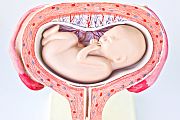Gestational diabetes less likely, but smaller infants more common
THURSDAY, Feb. 26, 2015 (HealthDay News) — After undergoing weight-loss surgery, women are significantly less prone to diabetes during pregnancy but twice as likely to deliver smaller-than-normal infants, according to a study published in the Feb. 26 issue of the New England Journal of Medicine.
Kari Johansson, Ph.D., a researcher and nutritionist at the Karolinska Institute in Stockholm, and colleagues used data from nationwide Swedish health registries to compare pregnancies between 596 women who had given birth after bariatric surgery and 2,356 women who hadn’t had the surgery but had the same body mass index.
The researchers found that only 1.9 percent of women who had weight-loss surgery developed gestational diabetes, compared to 6.8 percent of the other group. The surgical group was also much less likely to give birth to larger-than-normal babies. However, the weight-loss surgery group was twice as likely to give birth to babies considered small for their gestational age, and their pregnancies were also of slightly shorter duration. Additionally, the surgical group experienced a slight bump in the rate of stillbirths.
The investigators didn’t examine what might have caused smaller babies among bariatric surgery recipients, or higher stillbirths. But Johansson told HealthDay that those outcomes might be due to reduced nutrient absorption resulting from the surgery, with a fetus not receiving sufficient nutrition. “It has been reported that gastric bypass increases the risk of protein, iron, vitamin B12, vitamin D, and calcium deficiencies,” she said. “Also, many women in our study may have been continuing to lose weight when they became pregnant. Continued weight loss may affect fetal nutrition and could influence growth.”
Full Text (subscription or payment may be required)
Editorial (subscription or payment may be required)
Copyright © 2015 HealthDay. All rights reserved.








